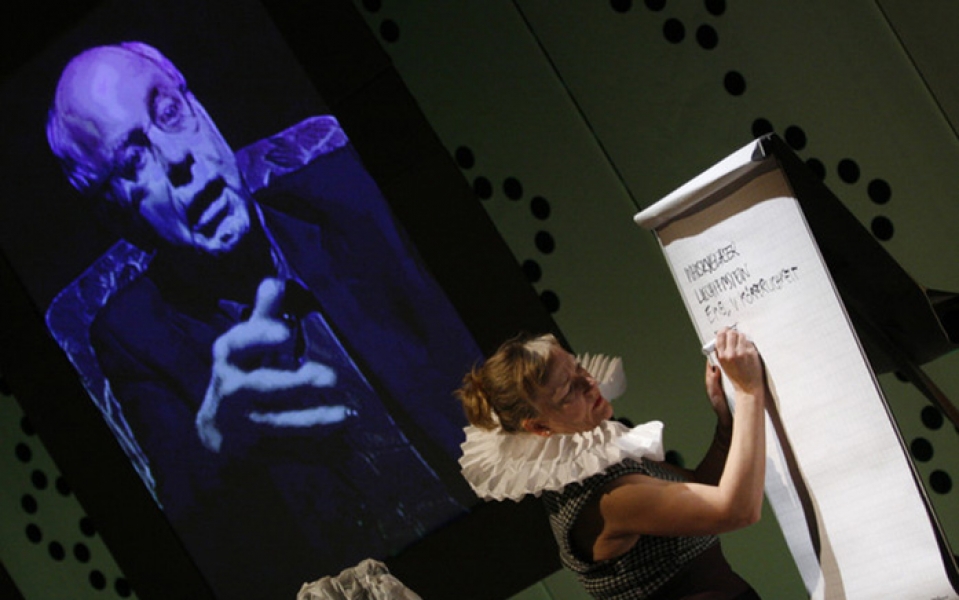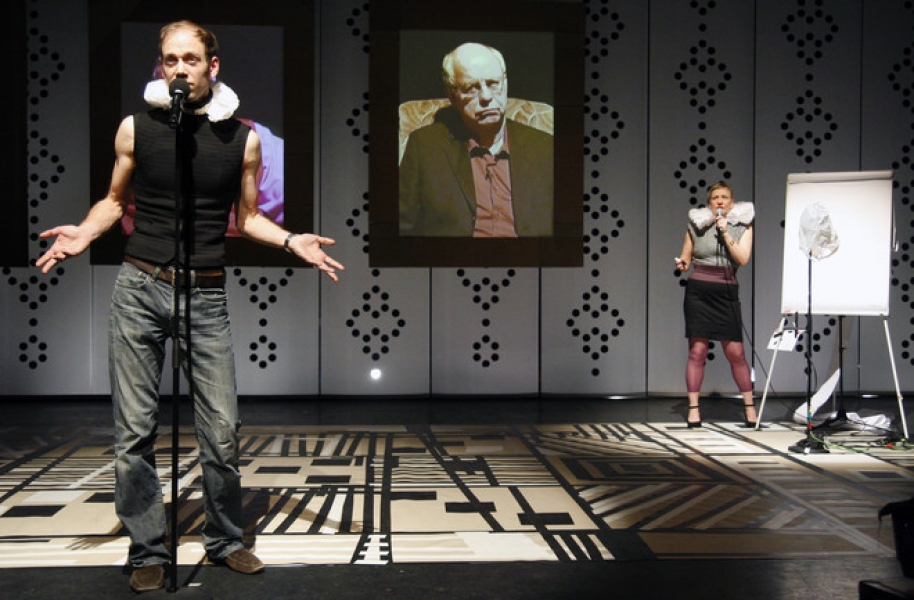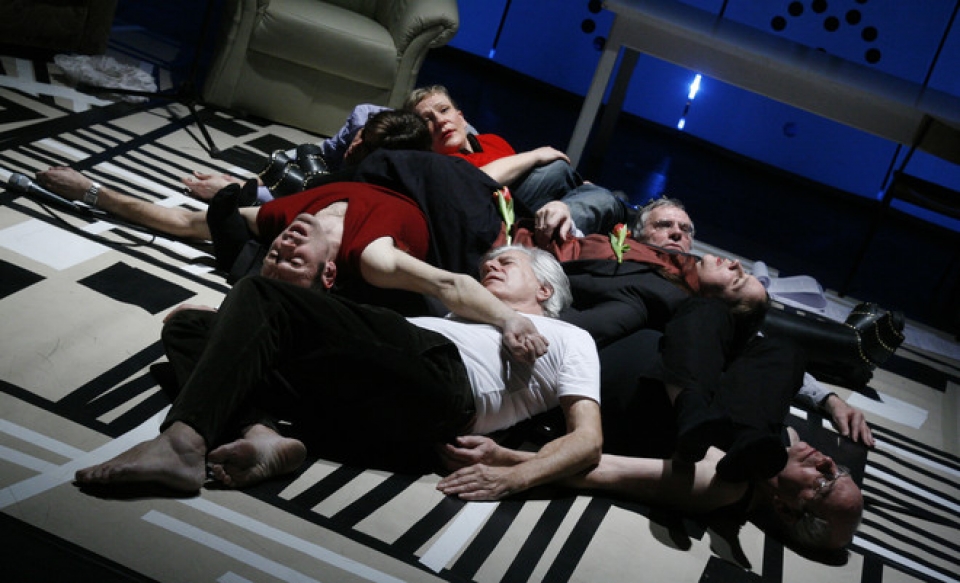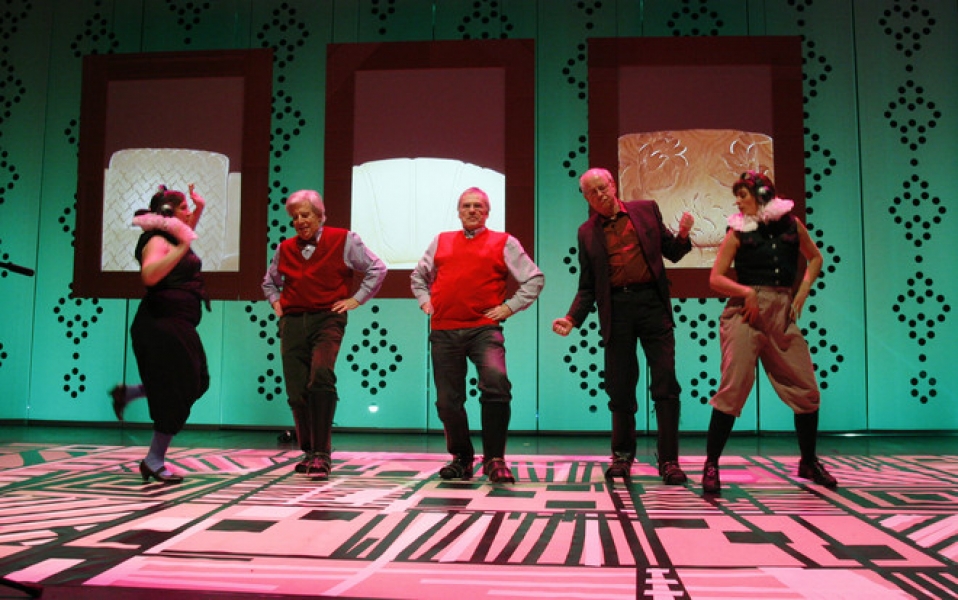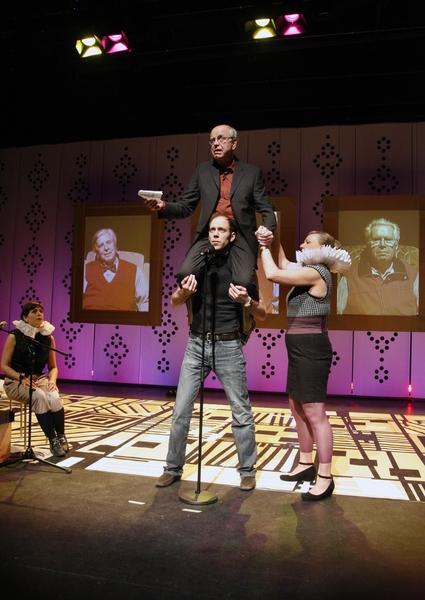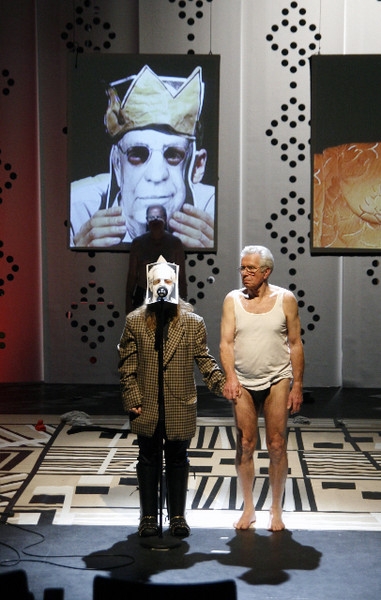Testament
“Better thou, hadst not been born than not to have pleased me better.” (King Lear to his daughter).
“Daddy’s working boots have filled their obligation.”(Dolly Parton about her father´s shoes).
She She Pop goes to work on the dramatic canon: In the first scene of Shakespeare’s “King Lear”, the old man makes an attempt to leave his kingdom to his three daughters and thereby to agree on his retirement arrangement – a plan that fails violently. Small wonder, as out of all the barter deals we have ever been involved in, the one between the generations is the most complicated and obscure one. Value and countervalue (i.e. money and love) are always veiled, nobody ever officially agreed on terms of this exchange. This is the case for almost all agreements between generations: they are foul. They never happened. They do not exist. The space that is to be cleared out is brimful with dates and details, jewellery and family trees, legal successions, hereditary diseases, loving vows, home care plans, gas receipts, and a sense of guilt – all of them subjects of public negotiations between daughters and their fathers.
In Testament She She Pop ask their fathers to join them on stage. The theater becomes a hearing room for a utopian process: equilibrium between generations.
Credits
With: Sebastian and Joachim Bark, Johanna Freiburg, Fanni and Peter Halmburger, Lisa Lucassen, Mieke und Manfred Matzke, Ilia and Theo Papatheodorou, Berit Stumpf.
Stage: She She Pop & Sandra Fox.
Costumes: Lea Søvsø.
Lightdesign: Sven Nichterlein.
Sound: Florian Fischer.
Music: Christopher Uhe.
Dramaturgical Advice: Kaja Jakstat.
Surtitles: KITA (David Maß).
Coordination and Support: Kaja Jakstat, Ruschka Steininger.
Technical Tour Support: Klaus Dust, Florian Fischer, Michael Lentner, Lars Egge Müggenburg, Sven Nichterlein. Production/PR: ehrliche arbeit – freelance office for culture.
Administration: Aminata Oelßner.
Company Management: Elke Weber.A She She Pop production.In Co-Production with the Hebbel am Ufer Berlin, Kampnagel Hamburg and FFT Düsseldorf.
Trailer
Awards
Winner of the “King Lear Arward” 2013 (Toronto, Canada).
Winner of a Dora Award 2013 (Toronto, Canada) as “Outstanding touring production“.
Winner of “Best theatre production in 2012” by “National Theater Association of Korea”.
Winner of the Friedrich-Luft-Preis 2011.
Winner of the Goethe-Institut-Preis at Impulse Festival 2011.
Invited for Theatertreffen Berlin 2011.
Chosen for nachtkritik Theatertreffen 2011.
Winner of the Wild Card of Theaterfestival Favoriten 2010.
Winner of “Best Guest-Performance 2010“ by “Göteborgs-Posten” (Sweden).
Nomination for the UBU Award 2015.
Dates
past dates:
Press
Testament was chosen by the “very young” jury of the 2015 Weimar Art Fest as the most heart-rending performance.
… the mutual sharp criticisms voiced and the profound tenderness surfacing in Testament make it simultaneously heartbreaking and heartwarming study of family relationships. Food for thought, for the rest of your life. Kate Basset, The Times Ireland, 05.06.2014
This is a show that feels intensely honest as if it were negotiating the relationships between one generation and another live on stage. We hear the arguments that took place during rehearsal. We sense the disapproval felt about some daughters’ life and work choices. The stage is awash with unspoken resentments, unacknowledged sacrifices and misunderstandings. But it is also awash with love and regret, and, in one of the final scenes, a great litany of forgiveness. It could be sentimental; it could be tricksy. It isn’t. Instead, it searingly exposes the ties that bind, the debts we owe, and the deficits and accumulations of love. Lyn Gardner, The Guardian, 04.06.2014
Intensely uncomfortable, exposing vulnerabilities in their relationships and creatively uncovering the tension of honesty in performance art. The result is an uncompromisingly true and personal production, which punches you with emotion and teaches us what we owe our parents, and how to forgive. Spectacularly inventive and beautifully orchestrated, Testament is not to be missed. Martha Quigley, Plays to see, 04.05.2014
Mixing contemporary music with projections, a German version of the King Lear script, and some dancing, She She Pop delivers a veritable feast for the eyes. Utilizing the whole stage in innovative ways, She She Pop definitely delivers a full-blown performance, breaking the fourth wall and divulging to the audience their behind the scenes work and process. … the use of multimedia is seamlessly integrated into an already multifaceted play.
Relatable, charming, hilarious at times, raw, and blunt, this piece is more than a translation and adaptation of Shakespeare, but rather a work of art, a performance that incorporates all you could want in a piece of theatre. … Really, you don’t want to miss this.
SAD MAG, Vancouver, 26. Januar 2013, Emily Ross
In sum, this is a fascinating and disturbing piece — at times almost frightening in its embrace of the cruel contours of geriatrics. In a simple yet brutal scene, we see children methodically undress the fathers, pull on their clothing and then assume the thrones.
…no actor raging through the storm can match the unease this act conveys. The safety net of metaphor evaporates into an uncomfortable confrontation of the vulnerability of age.
Minneapolis Star Tribune, January 18th 2013, Graydon Royce
“Deconstruction” assumes a “reconstruction,” or perhaps even a “rediscovery.” As the text undergoes the deconstruction, it reshapes the play for performance. Think of it as a journey whereby a play is scrutinized, (re-)interpreted, and freshly revealed on stage by a company of artists.
In Germany, such undertakings have been openly embraced, albeit with mixed results. Many shows take pride in being experimental and daring theatrical explorations. An eloquent proof comes from the theatrical collective She She Pop…
Hailing from Berlin, the group has garnered many accolades, along with an inescapable cortege of controversies. Given its stated mission, She She Pop examines the way the canon of classics (Shakespeare being preeminent here) meets our present view of the world…
It is a provocative, engaging, fascinating and highly unorthodox exploration of immediate topics made apparent by their idiosyncratic “reading” (i.e., deconstructed and reconstructed) of Shakespeare’s King Lear. She She Pop’s deconstructed King Lear is, at its core, audacious and relevant…
„Reconstructing King Lear’s Tragic Condition“, commissioned for www.walkerart.org, 14. Januar 2013, Michael Lupu (Senior Dramaturg at the Guthrie Theater in Minneapolis, Minnesota, USA)
Vor Testament hat She She Pop schon oft Themen wie Gesellschaft und Autorität behandelt, jedoch nie hatte ein Theaterstück den Ausgangspunkt gebildet. Die Gruppe lehnte dies stets ab, denn sie wolle „spontane Situationen schaffen, die die Performer und das Publikum gemeinsam meistern müssen“, erklärt das Kollektiv in einem Interview des Festival d´Automne einstimmig. Doch als eines der Mitglieder 40 wurde, fand She She Pop, dass die Zeit nun reif sei, um die Macht und Verantwortung zu hinterfragen, die Alter und Leistung verleihen. Shakespare, mit seinem König Lear, den erbenden Töchtern und dem unglücklichen Verlauf des Ganzen, hat sich da natürlich aufgedrängt. Doch She She Pop sind ihren Prinzipien treu geblieben: sie selbst zu sein, auf der Bühne, nicht sie als Schauspieler. Den Text als Informationsbasis zu nutzen, ohne ihn zu inszenieren. Einen Dialog mit den Zuschauern anzubahnen, ohne zu schummeln. Und um nicht zu schummeln konnte es im Fall von Testament nur eine Lösung geben: die Väter in das Projekt einzubinden und sie auf die Bühne zu bringen – es gilt schließlich die Frage von Nachfolge und Erbe zu klären. Schwer zu erklären, wie dem Kollektiv diese hervorragende Leistung gelungen ist. Natürlich lachen Sie, wenn Sie sehen, wie Lear in eine mathematische Gleichung verwandelt wird. Jedoch, ohne sich dessen bewusst zu sein, sind Sie hier schon am Kern der Sache: der Diskrepanz zwischen dem Leben eines Mannes, der nach einer Wahrheit sucht, die im Theater nicht zu finden ist und dem seines Kindes, das sich für die Wahrheit des Theaters entschieden hat, die im Leben unauffindbar ist. Es wäre in dieser Banalität sehr hart, um nicht zu sagen unerträglich, wenn es ihm nicht gelänge, ausgerechnet durch die Abwesenheit von Zugeständnissen Brücken zwischen den Generationen zu schlagen und die Dinge neu aufzurollen. Zärtlichkeit eingeschlossen. Um zu erfahren, wie der Umschwung vom Krieg zu einem hoffnungsvollen Frieden geschehen kann, gehen sie ins Theater des Abbesses. Sie sehen dort, am Ende von Testament, wie drei Väter und ihre Kinder ihre Stimmen zusammen erheben, zu einer Litanei des „Ich vergebe dir, …“. Sie werden verstehen, warum.
Brigitte Salino, Le Monde, 30.11.2012
Die deutsche Performance-Gruppe She She Pop präsentiert heute ihr mehrfach ausgezeichnetes Stück Testament in Sao Paolo. Dieses Stück ist paradigmatisch für das in Deutschland praktizierte zeitgenössische Theater, ein überwiegend von Prinzipien der postmodernen Ästhetik geprägtes Theater wie der kollektiven textuellen Schöpfung, einer Verweigerung der szenischen Täuschung und einer komplexen Mischung fiktionaler und realer Elemente…
Folha de Sao Paolo, 06. Oktober 2012, Marcio Aquiles
Brilliant, einfallsreich, streng, voller bemerkenswerter Momente. … Marthaler hätte es nicht besser orchestrieren können.
El Paìs, Madrid, 14.Juli, 2012, Marcos Ordónez
Wenn die erste Vorstellung des diesjährigen Grec den Maßstab für das Festival setzt, dann haben wir Glück. Das Stück Testament der deutschen Kompanie She She She Pop bietet, unter anderen Tugenden, eine schillernde Originalität. … In anderen Worten handelt sich hier um eine Originalität, die von banalen Coups und jeglichen billigen Ansätzen entfernt ist und die sich gern von der vermeintlichen Permissivität der sogenannten neuen Tendenzen schützen möchte.?…
La Vanguardia, Barcelona, 08. Juli 2012, Joan-Anton Benach
…At its tempestuous centre, Testament is about how relationships with our fathers must be renegotiated as we move towards and then beyond that pivotal point when the roles of carer and cared for are swapped – here this changeover takes place during the storm scene in Act III, when to a pumped up soundtrack we see teh daughters divest their fathers of their boots and breeches, and usurp their thrones in cardboard crowns, whooping all the while. We watch as the three men reduced to their underwear, ageing bodies exposed, rally their efforts to reclaim the text from their daughters and their dignity in the face of age; a shaking hand scrolls back through Lear to outline in red pen the pasage which must not be overlooked. It’s a strong and moving image in a production which otherwise eschews the provoking of strong emotions – much as the fair Cordelia might refuse to be manipulated into such declarations.
In bringing their real fathers on stage in Testament, She She Pop is striving to get beyond artifice and illusion to reach something true – but the ultimate gesture is made by their fathers, who are not actors after all, yet are willing to do this for their daughters…
Fíona Ní Chinnèide, www.irishtheatremagazine.ie/Reviews/Ulster-Bank-Dublin-Th., october 14th, 2011
… It’s amusing and heartfelt and honest. …
What made Testament such a joy to behold was how the company managed to be so facetious and light-hearted, entertaining and intelligent about matters of real consequence and still manage to truly affect, enlighten and disturb. They have not forgotten, that underneath theatrical ingenuity must lie a truth that needs expressing, that all the laughs and artifice must honor. It was a theatrical etiquette lesson.“
Caomhan Keane, entertainment.ie/Theatre/feature/She-She-Pop, 13 October 2011.
She She Pop & Their Fathers: Testament. Samuel Beckett Theatre
A brisk introduction, a modest fanfare and the ageing King Lear takes his throne. Eagerly anticipating his retirement plan (an unburden’d crawl towards death), Lear addresses himself to his darker purpose: dividing his kingdom among three daughters, appointing shares to whoever can shout her love the loudest. Watching three genuine fathers, in the springtime of their senescence, take to their own thrones – mismatching armchairs on a lightly suggested livingroom set – you immediately appreciate the playful depth of thought that She She Pop has put into this formally adventurous, slyly affecting piece of reality theatre.
Part text analysis, part self-ananlysis, the German company’s production explores Shakespearean archetypes as enduring models of contemporary psychology. That may sound like a needlessly dry interpretation of four female performers manning a flip chart and video projections while waering Elizabethan ruffs. But the heady pleasure of Testament is that you can have a lot of fun while being smart:if life imitates art, even a karaoke version of Something Stupid can be archly political.
Introducing King Lear as a play about „inheritance and betrayal, old age and decline“, Ilia Papatheodorou risks essentialising the drama fort he sake of a handy schematic (at the risk of sounding unnecessarily reductive, King Lear is about everything). But if that means paring the dramaturgical framework right back, you have to start from somewhere. As Lear himself memorably says, „Aus Nichts kann nichts entspringen“ – „Nothing will come of nothing.”
Indeed, one of the pleasures of the show is seeing the play’s logic expressed in a contemporary German idiom, which is to say an enjoyably deadpan reductio ad absurdum.
When Manfred Matzke, a clear-sighted rationalist who is anti-conflict, interrupts the performance with an economic analysis of Lear’s errors („The answer is given to us by this system of differential equations…“) it isn’t just funny; it recognises the fathers as contributors to the show’s dramaturgy. Even the show’s process becomes an illustration of filial conflict and threatened parental dignity, a poignant illustration of generational succession.
Nowhere is this more quietly unsettling than when the fathers question the ethics of exposing their lives to an audience, or the honesty of their daughters. In this Lear, nobody wants to play the Fool. It leads to an astonishing moment in which one father expresses „shame and embarrassment“ for his daughter’s performance art. „We are now in the storm scene,“ announces Lisa Lucassen, understandably.
Such genuine clashes make the participation of these fathers both brave and moving, a compact that ensures not even a line dance will compromise their dignity. They may not tell you anything new about Shakespeare’s play, but She She Pop’s bold and touching experiment lets the play tell us something new about our lives.
Peter Crawley, THE IRISH TIMES Weekend Review, October 8, 2011.
This piece has been celebrated and for good reasons, as can be stated after the Zurich premiere of „Testament“ by She She Pop and their fathers. It stirred the audience considerably and set a first highlight at the Theaterspektakel.
Claudio Steiger, NZZ, August, 20th, 2011
Theatertreffen 2011
“Rarely do the great questions of life present themselves on stage so spirited and full of feeling , so touching and allusive… Absolutely remarkable.”
Dirk Pilz, NZZ Online. June, 1st, 2011
Interview with She She Pop, Theatertreffen 2011
Lear goes She She Pop
The first time I saw a theatre piece by She She Pop, “Homestory” in 2002, I was plagued by lovesickness. Nothing helped counter these feelings of frustration more than seeing this piece. Seldom had I felt so well understood in all the woes of having to get through the day alone and constantly having to motivate myself to do something, just like the seven ladies in the She She Pop group and the sole male colleague incorporated into their female collective, Sebastian Bark.
I still can recall a scene, which was a wonderful exaggeration of the desire to crawl into a hole and of the search for protection against all the exertions of having to cultivate an image: As of today, announced performer Ilia Papatheodorou, “I don’t want to have anymore, I just want to be.” She decided to assume the existence of a bedspread and subsequently entered into a monologue from beneath the bedcovers about her relief of not having to come up with an identity day after day.
At this point in time She She Pop was not exactly famous for pampering their audiences with sympathetic understanding. Just the opposite. Their tendency to be on the nasty side, torturing the audience a little through intense observation, judgment, and even punishment (such as being forced to put on an ass-shaped mask) played no small role in the reputation of the group, which was formed in the 1990s in the Department of Applied Drama at the University of Geissen.
Their performances were actually a little scary. All that hardball squaring of accounts with the voyeuristic position in which viewers can make themselves comfortable was one of the outstanding qualities of their evening performances of “Live” (as of 1999) and “Bad” (as of 2002).
“The fact that we work in a very confrontational, direct, and discursive way has something to do with our history as a women’s collective,” says Ilia Papatheodorou, who has come to the interview along with Mieke Matzke. It was the experience of the comparing gaze, of being judged and categorised as a woman and female artist in the context of a student project that provided the initial spark for the founding of She She Pop.
“Who is the best dancer, who is the funniest, who is the fattest, who is the most spontaneous – on the stage women are the subject of this voyeuristic gaze to a much greater extent than men. As a way of fighting back, we turned on the lights where the audience sits and returned the gaze.” Particularly because She She Pop maintains a feminist perspective, it is all the more surprising that they have been invited to the Theatertreffen with a piece in which they appear on stage with their fathers and closely examine the contract between generations. Soon after its premiere in February 2010, “Testament – Belated Preparations for a New Generation Based on Lear” was invited for guest performances and to festivals. With increasing frequency the daughters had to call their fathers and schedule joint performances.
Does this success surprise She She Pop? Not really, says Mieke Matzke, because even when the piece was still in its conceptual phase they noticed the inherent power of the material as something many people could identify with. “People came to us from all sides with their father stories.” But “Testament” also has developed into such an impressive work, because it conveys the problems experienced during rehearsals, doubts, and lack of understanding. The discussions during rehearsals between the daughters and fathers, which threatened to end the project, where recorded and are now replayed for the actors through headphones. The way the performers quietly repeat the words, either insisting on their initial point or distancing themselves from it in their observations, constitutes some of the most brilliant scenes of the piece. Thinking becomes audible, visible, palpable.
For the performers, opening themselves to their fathers’ critique of their art was a major challenge. This was especially difficult, because these fathers were not conservative, authoritarian blockheads but rather educated middle class 68ers with high expectations regarding their children’s capacity for emancipation and self-realisation.
As a viewer, one often has the sense that the fathers and daughters are actually much closer than they themselves think. But precisely because their conflicts are not negotiated in a clichee-like but instead detailed and very concrete manner, the honesty of the individual positions is moving.
The comparison of these autobiographical experiences with Shakespeare’s “King Lear” – the story of the old king who can’t get his act together in terms of handing over his power and wealth to his daughters – provides for tension. She She Pop uses this material to address many things that anyone with aging parents must face: Who will help, when they need support? How much of one’s own life is one willing to invest in their care? How do siblings view the division of parental love and their parents’ inheritance?
The calculations (what is an hour of parental love worth in euros?) and sample cases that She She Pop uses to explore these questions are amusing, on the one hand, especially because they are often presented in very dry style. On the other, they reveal the lack of existing language for addressing these questions without one party being hurt.
She She Pop’s longstanding experience in creating simple but complex narrative images comes to their advantage in “Testament“. In the beginning small video cameras are pointed at the fathers’ faces, which are projected within three large picture frames – already establishing a style characteristic of regal representation. It is precisely here, later, where the children don cardboard crowns and put on the shirts of their fathers, who experienced taking them off as an act of humiliation.
At the end, the three picture frames present an almost baroque vanitas motif with tulips and apples, beneath which daughters, fathers, and one son lie on top of each other in layers – a confirmation of their connection above and beyond all discursive issues. It is also an anticipation of the mortality that unites them. This is She She Pop, and this is Shakespeare at its best.
Today, most members of the collective are close to 40 in age. Ilia Papatheodouro brought her baby son to the interview. Rehearsals now need to be coordinated with the care of seven young children. The perplexity and despair of this dual role as mothers and artists fuelled much of the comedy in their “Seven Sisters” performance, which preceded “Testament” and raised feminist issues more explicitly than earlier pieces. “Now that we have our own families and have brought the conflicts with our own partners on board, the experience of fighting over who does what and when with the kids, plays a major role,” says Ilia. And Mieke adds: “While we were rehearsing ‘Seven Sisters’, the discussion came up again: Where do we really stand? Can we really talk about having accomplished something, or achieved our goals? Or why do we get bogged down on so many levels, why are so many concealed?”
She She Pop never wanted to start their own theatre. They felt they were in good hands with their co-production partners, Kampnagel in Hamburg, the Hebbel am Ufer in Berlin, and the FFT Düsseldorf. Important to them in their process was being able to maintain autonomy over their collective and their projects. “Because we held on to our feminist standpoint and the collective, we were often accused of being stuck in the 1970s,” says Mieke Matzke, “but today there is a renewed focus on and political interest in these concepts, also in terms of their utopian potential. Working in a collective also means creating a different kind of obligation to one another, which goes beyond networking.”
Apropos utopia, in “Seven Sisters” three of the small, preschool children appear in a projection as if they had been playing in a back room of the theatre the whole time. At the end they are given the task of developing a utopia. “If someone asks you where you are going, say ‘to Moscow, to Moscow,’ instructs Sebastian Bark, packing them into anoraks and sending them out onto the street in the dark of night.
On the one hand, this is a quote from Chekhov’s “Three Sisters”, to which the production continuously refers in exploring the question of the right way to live. On the other hand, the image of little children on the street at night pointedly conveys the contemporary fear of having no more utopias, of being utterly unable to paint a positive picture of the future. And also the fear of exposing one’s children to terrible uncertainty.
Actually, major drama – but packed into such a small picture, as if this pounding concern needs to be forcibly kept down to size, if we are to keep functioning. And ultimately the art of She She Pop lies in this ability to specifically nail down vague thinking.
Katrin Bettina Müller, Tageszeitung, 29.04.2011
Laudatio zum Friedrich-Luft-Preis
“Besonders bemerkenswert an Testament ist der Mut sich den universellen Themen zu stellen, wie eben Tod, Krankheit, Einsamkeit, Vergänglichkeit und immer wieder steht auch die große alte Dame Zeit auf der Bühne. Mal mehr mal weniger im Vordergrund und doch schon dadurch immer präsent, daß die Akteure so deutlich sichtbar immer Kinder ihrer Zeit sind und bleiben werden”.
Laudatio von Claudia Wiedemer, 05.04.2011
“I WILL ALWAYS LOVE YOU
For twelve years now, the performance collective SHE SHE POP has transformed issues of (also) personal meaning to them into theater. Their most recent production “Testament” is a particularly well-made and successful example of this.”
Eva Behrendt, Theater heute, 06/ 2010
“Once the first “Lear” scene is read, the beautiful delirium, which She She Pop so expertly know how to work with, sneaks its way onto the stage… The She She Pop fraud is less about lying than about dithering. Dithering between process and product, discussion and text, intimacy and distance… In the personal conversations, the piece surprisingly returns over and over again to precisely those leitmotifs, which propel the old drama forward. “Testament” offers hundreds of such possible misunderstandings.”
Tobi Müller, Frankfurter Rundschau, February 27th, 2010
“courageous, honest and intelligent… a big hit.”
Klaus Witzeling, Hamburger Abendblatt, March 9th, 2010
